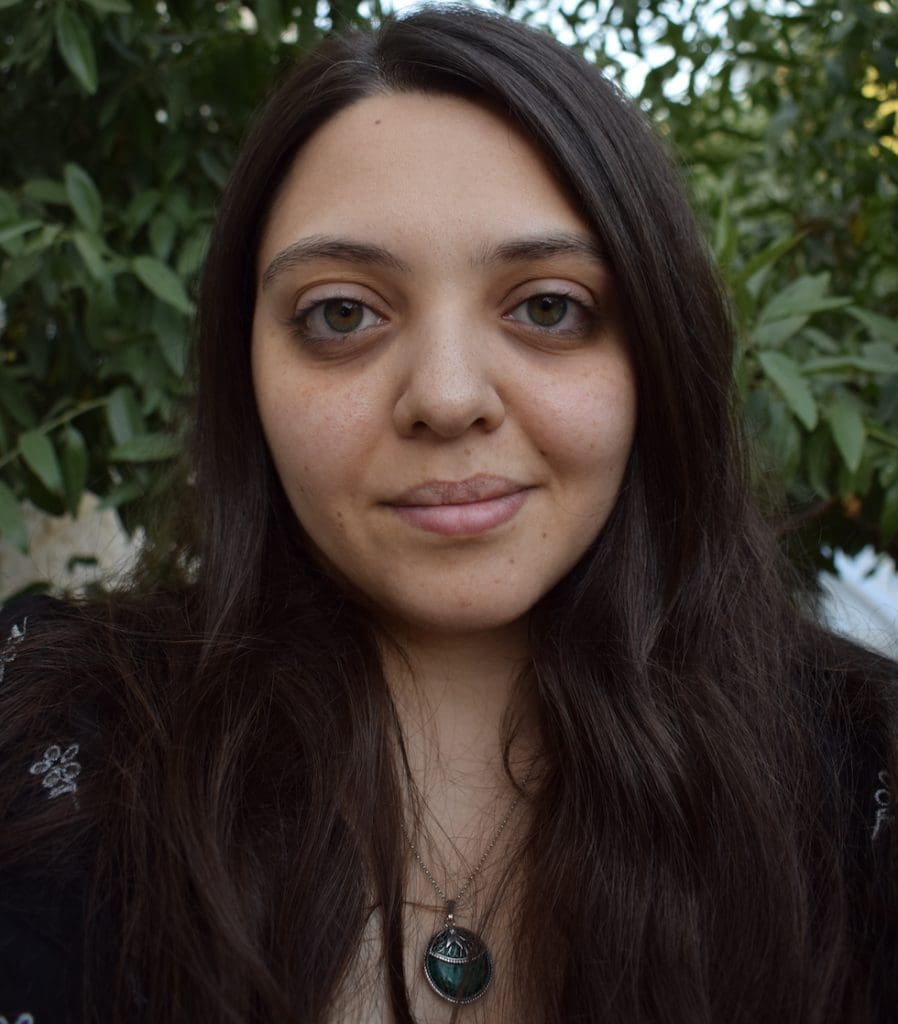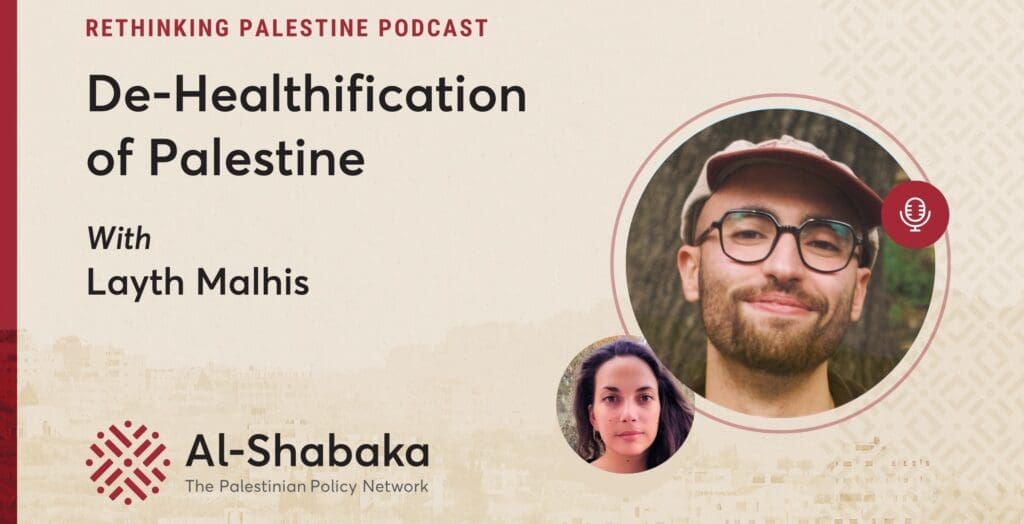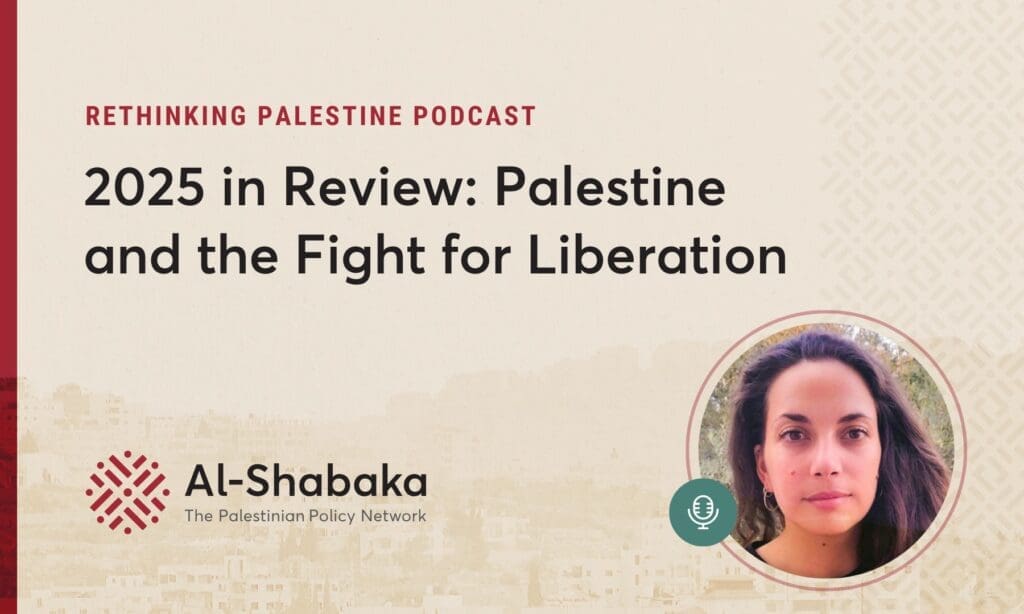About This Episode
Episode Transcript
The transcript below has been lightly edited for brevity and clarity.
Rania Muhareb 00:00
Together with an ICC investigation, there needs to be also effective measures by states – sanctions to bring to an end the illegal situation, including the apartheid regime imposed over the Palestinian people, and other effective measures in order to end Israeli impunity.
Yara Hawari 00:25
This is Rethinking Palestine, a podcast from Al-Shabaka: The Palestinian Policy Network, a virtual think tank that aims to foster public debate on Palestinian human rights and self-determination. We draw upon the vast knowledge and experience of the Palestinian people, whether in Palestine or in exile, to put forward strong and diverse Palestinian policy voices. In this podcast, we will be bringing these voices to you, so that you can listen to Palestinian sharing their analysis wherever you are in the world.
In early March, 2021, the International Criminal Court prosecutor launched a formal inquiry into alleged crimes in the 1967 occupied Palestinian territories. This was the latest move in Palestine’s lengthy ICC journey, which began over a decade ago now. And many legal experts have remained optimistic, some cautiously so, at the possibility of pursuing justice for Palestinians. But there are also those who have been less optimistic, citing the many challenges that lie ahead and institutional issues within the ICC itself. Indeed, the question that was recently put to a US State Department spokesman, Where did the Palestinians go for justice? remains as pertinent as ever.
To discuss all of this, I’m joined by Al-Shabaka member, Rania Muhareb, who is currently a PhD scholar at the Irish Center for Human Rights at the National University of Ireland in Galway. She also formally worked in legal research and advocacy with the Palestinian human rights organization Al-Haq.
Rania, thank you for joining me.
Rania Muhareb 02:04
Thanks so much for having me, Yara.
Yara Hawari 02:06
So, Rania, I wondered if we could start with a very quick summary of Palestine’s ICC journeys so far?
Rania Muhareb 02:14
Of course. As you know, Yara, Palestine’s journey at the ICC is a long one. It’s therefore important that we contextualize the recent decision of the ICC prosecutor to finally open an investigation into the situation in Palestine.
As you know, Palestinians have sought justice at the ICC for over a decade. In 2009, Palestinian officials first made a declaration submitting the occupied Palestinian territory to the ICC’s jurisdiction. This declaration followed Israel’s large-scale military offensive, code-named Operation Cast Lead, over the Gaza Strip in 2008-2009, which killed 1,409 Palestinians. After several years of silence, the declaration was ultimately rejected by the former ICC prosecutor in April 2012, on the basis that Palestine was not recognized as a state by the UN. Still the ICC’s Office of the Prosecutor held that it could in the future consider allegations of crimes committed in Palestine, following a determination on Palestinian statehood – which came, as we know, in November 2012, when Palestine was admitted to the UN General Assembly as a non-member observer state.
Palestine subsequently exceeded to a number of international treaties, including the ICC’s Rome Statutes in January, 2015. Together with a succession, Palestine submitted a declaration accepting the ICC’s jurisdiction over crimes committed in the occupied Palestinian territory since the 13th of June, 2014. This retroactive temporal scope was chosen in order to cover Operation Protective Edge, Israel’s massive military assault on Palestinians in the Gaza Strip in 2014, which led to the killing of 2,215 Palestinians.
And then, as we know, for the next five years, the ICC’s prosecutor, Fatou Bensouda, would carry out a detailed preliminary examination into the situation in Palestine. This preliminary examination sought to determine whether the criteria for opening an investigation under the Rome Statutes have been met. And during this time, Palestine in human rights organizations, including Al-Haq, made a number of detailed submissions to the ICC, including on Operation Protective Edge, on the illegal closure of the Gaza Strip as a form of persecution, and on Israel’s illegal settlement enterprise in the occupied West Bank, including East Jerusalem.
In December 2019, the prosecutor finally concluded her preliminary examination into the situation in Palestine. She stated at the time that she was satisfied that crimes have been, or are being, committed in the occupied Palestinian territory, which comprises the West Bank, including East Jerusalem, and the Gaza Strip. And with the conclusion of the preliminary examination, the prosecutor decided to request a ruling from the ICC’s Pre-Trial Chamber I to confirm the court’s territorial jurisdiction in Palestine. The prosecutor stated that such a ruling would grant greater clarity and reinforce legitimacy to a future investigation into the situation.
Then just last month, as we know, the ICC’s Pre-Trial Chamber I confirmed the court’s territorial jurisdiction in Palestine as encompassing the entirety of the occupied Palestinian territory. And this gave way for the prosecutor’s decision on the 3rd of March to launch an investigation into suspected war crimes and crimes against humanity committed in the occupied Palestinian territory.
Yara Hawari 05:36
So, Rania, you mentioned that earlier this year we saw the Office of the Prosecutor and the Pre-Trial Chamber decided, after a really long deliberation, that the ICC does have jurisdiction and will pursue an investigation of war crimes and crimes against humanity committed in Palestine.
Now is this grounds to celebrate? Because for many people, it really sounds like it is.
Rania Muhareb 06:00
So I think the first thing we have to see here is that the recent decision by the prosecutor to launch an investigation and, of course before that, by the Pre-Trial Chamber I to confirm territorial jurisdiction in the situation in Palestine are important in terms of their symbolic significance for Palestinian victims and for the pursuit of international justice and accountability.
As we know, for seven decades the Palestinian people have been denied the exercise of their inalienable rights. Since the Nakba, millions of Palestinians have been illegally displaced and dispossessed from their lands and properties and denied their right of return. We also know that a key factor in prolonging Palestinian oppression has been Israel’s institutionalized impunity for widespread and systematic human rights violations, targeting the Palestinian people. We know that impunity has systematically shielded Israeli perpetrators from accountability and even facilitates the ongoing displacement and dispossession of Palestinians. So this is the context within which the significance of the recent decision needs to be considered.
And we also know that the prosecutor has already stated that she has reason to believe that crimes have been committed, including by the Israeli occupying authorities and the Israeli military, against Palestinian victims. An ICC investigation would therefore look at individual perpetrators of suspected crimes committed in the occupied Palestinian territory, and we hope that this investigation will consider population transfer, destruction of property, willful killing, torture, and even the crime of Apartheid.
However, as you said, we need to also be realistic about the recent decision, in terms of what it can bring and what is possible for Palestinians at the ICC. The political landscape faced by the ICC is a challenging one, and maybe we will talk about that in a bit, but it’s important to consider first that the ICC has limitations built into its very framework. These limitations mean that it looks at individual crimes rather than systemic enterprises. And the second issue that we need to consider is the temporal scope and, potentially, the geographic scope of the investigation that we might have. On the one hand, as I mentioned earlier, the temporal scope of the court’s jurisdiction is since the 13th of June, 2014. This means that suspected crimes committed before that date are not likely to be considered by the court, or at least the court does not have jurisdiction over them.
What we do hope to see, however, is for continuing crimes – including, for example, illegal settlement construction and expansion since before that date – to be considered within the broader context of Palestinian dispossession. So this is something that we hope the court will take into consideration. And then we have the question of the geographic scope. So, with the recent decision by the Pre-Trial Chamber, there is confirmation that the court has jurisdiction over the occupied Palestinian territory – that is to say, the West Bank, including East Jerusalem, and the Gaza Strip.
But we also know that the colonial dispossession and displacement of the Palestinian people exceeds that territorial scope, in the sense that it targets the Palestinian people as a whole on both sides of the Green Line and in exile. And, in this regard, there has been no international investigation, including by UN mechanisms, to date which has meaningfully addressed the plight of the Palestinian people as a whole. This is something that we will continue to see at the ICC, in terms of a fragmented approach towards the question of Palestine.
That being said, there are certain things we hope to see, because the court does now have jurisdiction since 2014, and this covers large-scale campaigns of atrocities committed against Palestinians, including Operation Protective Edge in the Gaza Strip in 2014, as well as the great March of Return demonstrations in the Gaza Strip in 2018 and 19.
These also symbolize the continued dispossession of Palestinians and denial of the right of return. So these are questions we hope that the ICC will genuinely consider and that it will look into in its investigation.
Yara Hawari 10:06
Yeah, thanks for pointing that out. It’s incredibly important that we remember that international mechanisms are usually limited in terms of treating Palestinians as a whole, but also in the temporal scope. I also sincerely hope the ICC will consider continuing crimes, such as the continuous building of settlements and displacement of Palestinians, but I think I remain very cautiously optimistic on that front.
Now, I want to turn to another ICC case, which might provide a worrying precedent and some justification to the claim that the ICC is only a court for crimes committed in the African continent, which is something that activists and critics usually talk about. So in December, 2020, the ICC abandoned its inquiry into alleged British war crimes in Iraq. And now this has been a long case: It began in 2006, when the ICC closed a preliminary examination of the case, claiming that the gravity was not serious enough, and then in 2014, the European Center for Constitutional and Human Rights filed for it to be reopened. So, in 2017, the Office of the Prosecutor acknowledged reasonable basis that war crimes had been committed, including willful killing, torture, cruel treatment, rape, and other forms of sexual violence. They then relied on the UK to conduct its own domestic investigations into the claims. And, no surprise here, no charges were brought against any soldier, hence the case being closed in 2020.
What kind of precedent does this set for Palestine, and what can we possibly learn?
Rania Muhareb 11:55
So I think that the first thing we need to remember is that the situation of Palestine before the ICC needs to be contextualized in terms of the ICC’s record to date. The situation in Iraq certainly provides cause for concern, in the sense that we realize that there is significant political pressure being placed on the ICC. Now, I do want to address the first point related to the question of investigations, whether internal investigations in the situation in Palestine could be used as a basis not to proceed into an ICC investigation.
We need to remember that Palestinian human rights organizations have already submitted a series of submissions to the ICC over the past five years, including on the genuine unwillingness and inability by the Israeli occupying authorities to prosecute suspected crimes committed in the occupied Palestinian territory, taking into consideration both Israeli military courts as well as Israeli civil courts, which have a long record of shielding perpetrators from accountability and from prosecuting suspected crimes against Palestinians. So it’s important to remember that this admissibility test was part of the prosecutor’s five-year preliminary examination, and this is why Palestinian rights organizations have already submitted on this question. And as part of the assessment by the prosecutor, in terms of closing the preliminary examination in Palestine, we had a decision also with regard to admissibility – that the case is admissible, and therefore this suggests that Israeli judicial mechanisms are not able or willing to genuinely prosecute the crimes that fall within the ICC’s jurisdiction.
But the Iraq precedent also provides cause for concern, in the sense that we know there remains significant political pressure on the Office of the Prosecutor, in the case of Palestine as well as other situations before the court. And I should point here to the fact that, for the past few years, there has been pressure by the United States administration against the ICC, including its officials and staff, including the prosecutor herself. Last year, the Trump administration issued an executive order imposing sanctions on the ICC prosecutor, Bensouda, and another senior ICC official in an effort to deter the court from investigating suspected crimes committed by US and Israeli officials in Afghanistan and in Palestine. And these attacks have continued. The executive order has not been repealed by the Biden administration to date, and countless civil society organizations have called for this order to be repealed in order to ensure that there’s support for an investigation.
During the past year, we’ve also seen states submitting to the Pre-Trial Chamber I in the situation in Palestine, arguing that the ICC does not have jurisdiction in Palestine and therefore that they do not support an investigation. So what we’re seeing here, the parallels between the situation of Iraq – an investigation that was not opened, despite recognition that crimes have been committed, including torture, killings, rape, and other outrages on personal dignity – and the situations of Afghanistan and Palestine, where there is serious pressure on the court not to genuinely investigate suspected crimes. This signals that the ICC’s environment is a very challenging one, and that there is a need for further support from states, civil society, and other stakeholders for a serious investigation into suspected crimes.
That being said for now, we are seeing that attacks are continuing and that there’s serious pressure on the ICC not to genuinely proceed.
Yara Hawari 15:51
If you’re enjoying this podcast, please visit our website, www.al-shabaka.org, where you will find more Palestinian policy analysis, and where you can join our mailing list and donate to support our work.
So there are really a lot of political challenges, and it seems like there’s a lot as well that falls in the hands of the prosecutor and the actual will of that individual to pursue things.
Now, what is the role of the Palestinian leadership in all of this? And I’m asking because we know in the past we’ve seen various so-called peace plans or funding proposals presented that are conditioned on the Palestinian leadership not pursuing an ICC investigation – indeed we saw this with Trump’s “deal of the century.” So if they are cajoled into such a thing in the future, would this stop the ICC investigation into Israeli war crimes? And perhaps, maybe you could also address what other kind of pressure the Palestinian leadership might face?
Rania Muhareb 16:56
In relation to the role of the Palestinian leadership, we need to, one, remember the context that we initially discussed, which is that justice has been pursued at the ICC since 2009, with an initial failure to open an investigation at that stage, and now finally, the decision to open this investigation.
This is the first real avenue for Palestinian victims to seek justice. There have been other avenues in the past, such as the pursuit of justice in third states- so in the courts of other countries under the principle of universal jurisdiction – but we saw in all of these instances that they resulted in a failure to hold Israeli perpetrators to account for various reasons, including political pressure imposed on the states that the attempted such prosecutions.
So with the ICC now, we have the first avenue where victims can genuinely seek accountability for crimes committed against them. And this is what we hope to see in the coming years. And we hope that the next ICC prosecutor, who will begin his term on the 16th of June, will look into the various crimes committed against Palestinians.
The role of the Palestinian leadership in this regard is important because the pursuit of justice and accountability should be the basis for the realization of Palestinian rights, and it should not be a condition, or it should not be hijacked, certainly, for political reasons. So, there is an important role here to play in terms of pursuing the ICC to its fullest extent as an avenue for justice for Palestinians, and not allowing politics to undermine that pursuit of justice, as we may have seen in the past.
Yara Hawari 18:44
So are there any positives we can take away from this? Is there any hope in an institution such as the ICC?
Rania Muhareb 18:53
So I mentioned earlier on that the ICC’s is role is to pursue individual criminal responsibility – so for individual perpetrators of serious crimes, crimes against humanity, and war crimes, including those committed in the occupied Palestinian territory. And we already had the recognition from the prosecutor that such crimes have been, or are being, committed in the Palestinian context. And in this regard, I think it’s important to remember that there are root causes of Palestinian oppression that are not the role of the ICC to address. These include the denial of the right of return of Palestinian refugees, the prolonged denial of Palestinian self-determination, and prolonged occupation as well as closure of Gaza.
Now I say this, but I think it’s important to remember that the ICC can and should play a role in this regard, even if it cannot address the very legality of the systemic enterprise and the institutionalized oppression of Palestinians. But it can look into specific crimes that perpetuate this reality of oppression, including the question of the denial of the right of return, and I talked earlier about the closure of the Gaza Strip as a form of persecution, as Palestinian human rights organizations have argued. So there is an important role here to play by the ICC in terms of addressing some of the root causes of Palestinian oppression, even if that may be limited, and there’s a need for other avenues to be pursued.
I do want to say one thing specifically about the denial of the right of return, because it’s been questioned whether the ICC can genuinely look into this question. And I think here, it’s important to remember that, several years ago, in September, 2018, the same Pre-Trial Chamber I, as in the situation in Palestine now, recognized in the case of Bangladesh/ Myanmar, that the denial of the rate of return of the Rohingya people may constitute a crime against humanity under the Rome Statute. And it specifically cited the right to enter one’s country under international human rights law and under the 1973 Apartheid Convention, and it highlighted specifically that the anguish of persons uprooted from their homes and forced to leave their countries deepened, and this renders the victim’s future even more uncertain and compels them to continue living in deplorable conditions.
So this recognition that we have in the situation in Bangladesh and Myanmar is an important one because it allows us to see what avenues there could be in terms of pursuing a case of the ICC for the denial of the right of return of Palestinian refugees. And it also reminds us that there have been decades of oppression targeting Palestinians. And this is the first avenue that Palestinians genuinely have to address that oppression.
I’ll highlight one last thing, which is that the ICC really provides an important avenue to address Israeli impunity. Its role may be limited in terms of the pursuit of Palestinian rights, but again, this is not the only avenue at our disposal, and there is a need for more concerted efforts. Together with an ICC investigation, there need to be also effective measures by states – sanctions to bring to an end the illegal situation, including the apartheid regime imposed over the Palestinian people, and other effective measures in order to end Israeli impunity – remembering, again, that the ICC has a very specific mandate, in terms of pursuing individual perpetrators but does not look at questions of state responsibility, for example, in prolonging the oppression of Palestinians. So this means that the ICC needs to be considered together with other avenues and not as an avenue on its own.
Finally, we know that states in the past, some states, have pursued justice in their own courts for perpetrators of serious crimes against Palestinians. These have not succeeded, as I mentioned, due to political pressure, but the obligation remains there. And in 2019, for example, the last UN Commission of Inquiry on the Great March of Return reminded states of their obligations under the Rome Statute but also under the Fourth Geneva Convention to prosecute or extradite perpetrators of grave breaches in their own jurisdictions.
So this is an important obligation that remains there and should be pursued alongside an investigation by the ICC and to the situation in Palestine.
Yara Hawari 23:28
Rania, thanks for that, and thanks for highlighting the Myanmar case and that of the Rohingya refugees, which really it’s an interesting precedent that I didn’t know about, and it seems that we have a lot to learn from other cases, which can teach us about different avenues that us as Palestinians could possibly pursue at the ICC.
And really thank you for that concise and nuanced analysis. The ICC investigation is an ongoing case, and I think something that you said really stuck with me – that the root causes of Palestinian oppression is not within the scope of the ICC to address, and that it is limited in terms of what justice can be achieved. And, importantly, that it’s not the only avenue within the international legal regime. Importantly, you mentioned a couple of things: You mentioned the possibility of pursuing Israeli war criminals in domestic courts in third-state countries, and also you mentioned sanctions, and I think this is something that many Palestinians hammer home about – that the ICC cannot be a tool that is used on its own; sanctions is possibly one of the most powerful tools in which to hold Israel accountable.
Rania, again, thank you so much for joining me, and I hope to see you back on this podcast soon.
Rania Muhareb 24:51
Thanks so much, Yara, for having me.
Yara Hawari 24:56
Thank you for listening to Rethinking Palestine. Don’t forget to subscribe and leave us a review. For more policy analysis. And to donate to support our work, please visit our website: www.al-shabaka.org. You can also follow us on Facebook and Twitter.














